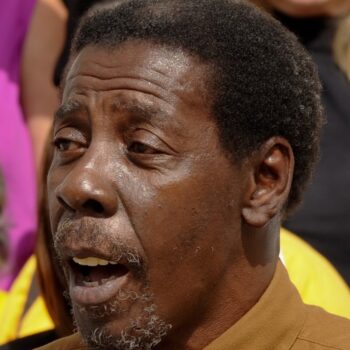The Forge: During the course of nearly 300 interviews and surveys with social justice organizational leaders and organizers around the country, we began by asking them each to share how concerned they are with the amount of power we have on the Left. The vast majority of folks told us that they are very concerned. Where do you find yourself on this spectrum? Is it the forever fate of those of us fighting for social justice to feel we are always lacking the power we need, and, if not, what are the top things we should do to build our power?
Anthony Thigpenn: I am also very concerned about the amount of power the Left has in the US. We have the power to sometimes get attention, even less of the time to be taken into account, but we rarely have the power to have significant influence or have an active role in decision making.
I do not think it is our forever fate to always lack the power we need. The top four things I think are needed to build the power to win truly systemic change are:
-
Move beyond the “empire-building” culture/framework/theory of change that has dominated modern community organizing for forty years or more.
-
Move beyond the defensive, tactical silos (issue, geography, constituency, etc.) to a more movement-building approach.
-
Develop a strategic approach that integrates electoral organizing, mass protest, and direct action as opposed to seeing them in conflict and contradiction.
-
Figure out how to develop and utilize what today is called strategic narrative, which influences and moves whole social sectors. This used to be called ideological development and the Right is way ahead of the Left on this front.
The Forge: The Power to Win report pulls together a lot of ideas around potential interventions that could allow our movement organizations to build greater power, and many of these suggestions have to do with organizations coming together to build a shared power analysis, to learn together, and to join forces across campaigns. What do these wishes for greater collaboration and linkages across campaigns and organizations say to you? Do the lenses of issue, geography, or organization splinter our movement too narrowly, or have we simply not built the right bridges?
AT: I think the wishes for greater collaboration speak to the realization that no one organization, issue, constituency, geography can build the power needed to achieve the systemic change it seeks on its own. The lenses of issue, geography, or organization don’t have to be splintering if they are part of a theory of change and strategy that integrates them into a large whole.
The Forge: Money and financial power surfaced as critical themes in the Power to Win report. Folks consistently identified corporations and wealthy individuals as the largest sites of power in the US, while they also by and large agreed that our own organizations are more accountable to our funders than to our constituencies. Do you think we can make allies of capital even as our movement works to subvert or upend the injustice inherent in the functioning of capitalism? If so, where have you seen this work? Is it about more strategic funding parameters or are there other practices we should be confronting?
AT: I tend to think that while we can make tactical allies of some sectors of capital, particularly in moments like the current one where the threat of authoritarianism and fascism is so pronounced, I am skeptical that we can make strategic allies of capital. Maybe if the power equation was more in the favor of the movements for justice… but that would not really be capitalism.
In fact, I think one of the conditions contributing to the insufficient power of the Left is the almost total dependency on foundation grants and the traps of the non-profit industrial complex.
I do think that there are elements of philanthropy that could approach being strategic allies under the right circumstances and conditions.
The Forge: Our findings indicate that many folks feel there is too much infighting happening in our movement, even while we are not spending enough time talking to people who do not agree with us. What do you make of this? We routinely talk about meeting people where they’re at –– not assuming high bars for political purity, for example, but instead finding common ground and doing the long-term work of political education. Do you see this happening enough? How do we internally confront and deal with our own messiness and inconsistencies around race, gender, and privilege without keeping that process from alienating new folks?
AT: As I mentioned above, I think a lot of the infighting is due to what has been the dominant culture of community organizing: the tactical traps of zero-sum silo organizing and the nature of the non-profit industrial complex.
I agree that we tend to talk in ways and language that mainly resonates with people who already agree with us (political purity). I’ve also seen organizing based on the lowest common denominator leading to almost meaningless incrementalism.
How to do common ground finding and the long-term work of political education as well as deal with our own messiness and inconsistencies is the cutting edge of what we need to figure out.
The Forge: The Action Lab and The Forge work across issue and geography, and we see the Power to Win report as a call for renewed efforts to build shared strategy and vision across the many organizations that help to shape the social justice movement today. The vast majority of leaders we talked to for this report agreed that we (the big WE) lack a unified vision, and most –– but not quite as many –– thought we should have one. What do you think? To what extent should unity in vision and strategy be a goal and why? Also, how do you think we best get there?
AT: I do agree that we need a bigger “we” and unified vision, though that would need to be an ever-growing we/vision. The shared vision and strategy would need to be contained in a shared theory of change. Contrary to the old vanguard party model, such a shared theory of change, vision, strategy doesn’t mean absolute unity in thought. There would need to be room for differences and struggle. That’s what would make we/vision/strategy living and ever growing.
How to get there is beyond the scope of these interview questions…

